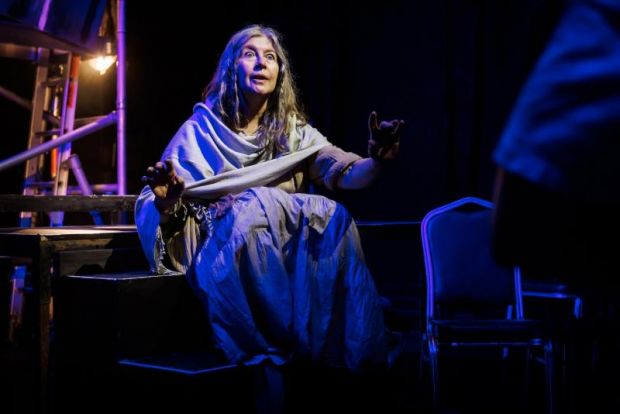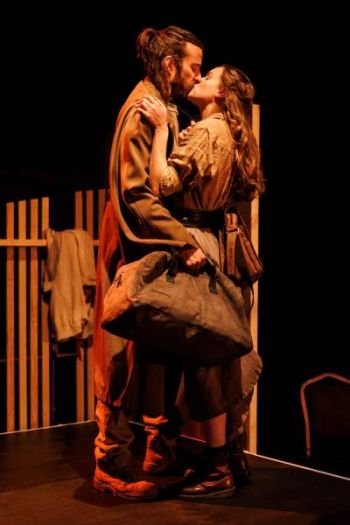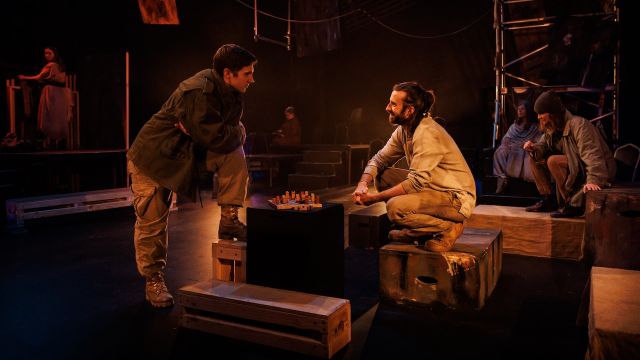Prophet
Prophet is an intense experience – rhetorical, demanding, driven by Jodi Gallagher’s underlying anger – and her wish to expose the ills of the present by depicting a dystopian future. The program quotes Marx and Engels’ Communist Manifesto: ‘All that is solid melts into air, all that is sacred is profaned…’ That sentence continues, ‘and man is at last compelled to face with sober senses his real conditions of life, and his relations with his kind.’
One of the disturbing aspects of Prophet is that it dramatises the fact that human beings do not confront ‘with sober senses’ their ‘real conditions of life’. Here, they are prevented from doing so, as Marx knew very well, by the myths and legends (‘certainties’) of the past, by tradition, by familial loyalties, by despair, and by fear.

Gallagher’s text brings together elements that are familiar to us all: a flooded city, shortages, warnings of disastrous global warming, a long-running war on the borders, - but also those elements that are traps, and dead ends: expedient political lying, a gulled populace, and the desperate need for answers leading to acceptance of false answers and solutions.
A young and traumatised soldier (Scott Middleton) returns from the front. His apparent clear-eyed demeanour and simplicity lead some – in particular a writer and truth seeker (Gabriel Partington) – to see him as more than he might be – as indeed, a Prophet. Meanwhile the Prophet’s fearfMother (Carole Patullo) warns him of the dangers. The writer’s admiration for and bonding with the ‘prophet’ causes a breach with his bewildered father (Dennis Coard) and the writer’s exasperated wife (Mia Landgren). Meanwhile, a cynical and duplicitous politician (Helen Hopkins) both calms and exploits the situation, claiming that all is well, and that creating anxiety is bad for productivity and therefore the economy.
 There are some excellent performances here. The always charismatic Carolyn Bock is a glittering eyed street person – and something of a prophet herself. Dennis Coard, usually cast as Mr Nice Guy, is here clear, strong and angry. Helen Hopkins’ politician is silkily plausible and loathsome.
There are some excellent performances here. The always charismatic Carolyn Bock is a glittering eyed street person – and something of a prophet herself. Dennis Coard, usually cast as Mr Nice Guy, is here clear, strong and angry. Helen Hopkins’ politician is silkily plausible and loathsome.
Sam Diamond’s set attempts, across the big Theatre Works space, to suggest a city in ruins where people live in holes in the walls, or on scaffolding, or amidst the debris in the streets. His costumes – with a couple of exceptions – are post disaster mode monochrome coats, beanies and heavy boots – which does seem a bit of a cliché as if Army Disposals were all that was available. J David Franzke’s sound design hums and unsettles throughout, enhanced by distant shots and explosions that are never explained. Bronwyn Pringle’s lighting follows the action in suitably crepuscular fashion, highlighting scenes of intense conflict with sharp revealing brightness.
But this is an ‘immersive’ production, which means, as it usually does, that the majority of the audience is standing for the duration (here about ninety minutes). The program suggests that the audience follow the performers, but this is impossible as the performers (quite correctly) move about the space, through the audience and from one platform to another. The audience scarcely knows where a character will pop up next until they begin speaking. Nearly all the audience gave up on ‘following’ very quickly and stayed put or tried to sit on the street level platforms, having to move when a performer needed them. This meant in turn that some dialogue was blurred or inaudible in that vast and acoustically notorious Theatre Works space. Mia Landgren, in particular, fell victim to this sound problem. It also meant that fine performances were lost as characters moved and had their backs to half the spectators half the time. From my position, Carolyn Bock’s crazy lady had her back to me for seventy per cent of the time.

In other places where the ‘immersive’ mode is employed (originating with Théâtre du Soleil, years ago, was it?) such as The Bridge Theatre in London, marshals move the audience from platform to platform to follow the action, and those who opt to sit are able to see everything.
In this case, it is a directorial problem, Gallagher electing to direct her own text. The idea, surely, is that the audience becomes ‘crowd’, here the citizens of the ruined city. I’m not sure that that’s what happens here since, overall, the audience isn’t all that immersed. By the end, the entire audience had retreated to the margins. It’s an important issue here because Prophet has some very fine writing – even if there is too much rhetoric and not enough plot – so it is crucial that we are with these characters and hear every word they say.
Michael Brindley
Photographer: Darren Gill
Subscribe to our E-Newsletter, buy our latest print edition or find a Performing Arts book at Book Nook.

